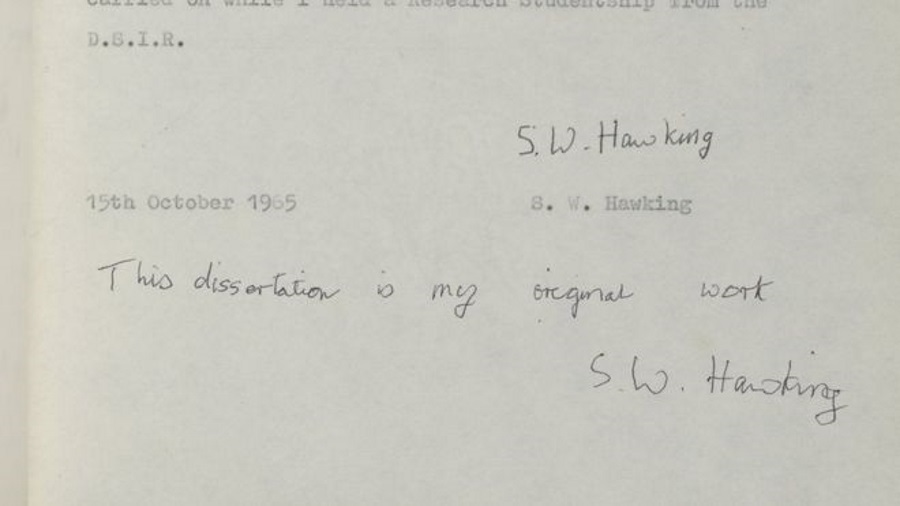Physicist Stephen Hawking made the University of Cambridge’s website crash after his thesis, which he wrote at the age of 24, was published online for the first time. More than 2 million people have entered to the site to review Hawking’s work.
As well, the famous professor amused and astonished fans last Friday night when he gave a public talk at the Oxford Mathematics Institute in Woodstock Road, where he focused on quantum black holes.

It was the inaugural lecture named after his long-time collaborator Roger Penrose. The sold-out public talk was also available online.
‘They often say the truth is stranger than fiction, and nowhere is that more true than with quantum black holes,” said Hawking last Friday night.
Stephen Hawking’s famous work
Without a doubt, Stephen Hawking, 75, has accomplished amazing achievements that most scientists can only dream of. He has been an inspiration for students, movies, and books. However, he is not only known by scientists.
Though many people don’t know what his theses are about or how they have influenced the scientific field, Stephen Hawking is known around the world as if he were something like the Einstein of the 21st century.
Nonetheless, now people will have access to what Stephen Hawking wrote during his first years as a physicist, when he was just a 24-year-old student at the Trinity Hall, Cambridge. The 1966 doctoral thesis was released online for the first time at Cambridge University’s website to celebrate Open Access Week 2017. The paper is titled “Properties of Expanding Universes,” and it is available in PDF format. People can freely access the site and download the paper.
Two million people have seen Hawking’s 1966 thesis
However, the paper received so much attention that the Cambridge University’s page crashed within hours after the paper’s release. The thesis was seen by more than 600,000 people, and since last week it has been downloaded by about 2 million people.
According to the university, most of the viewers were not academic but just regular people who are interested in Hawking. So it is not hard to imagine why the servers crashed as scientific works don’t tend to receive that much of attention.
The University stated that even when they have a popular thesis on their site, they get about 100 views per month, typically. So definitely this was something extraordinary.
“Each generation stands on the shoulders of those who have gone before them, just as I did as a young Ph.D. student in Cambridge, inspired by the work of Isaac Newton, James Clerk Maxwell and Albert Einstein. It’s wonderful to hear how many people have already shown an interest in downloading my thesis – hopefully, they won’t be disappointed now that they finally have access to it!” said the recognized professor on the matter.
Hawking wants to inspire people around the world
Before Hawking’s thesis was released online on the Cambridge’s Open Access repository, Apollo, people had to pay and asked for access to the 134-page document. Recently, Hawking said that by releasing his work he hopes to inspire people and because he believes that everybody should have access to information.

“By making my Ph.D. thesis Open Access, I hope to inspire people around the world to look up at the stars and not down at their feet; to wonder about our place in the universe and to try and make sense of the cosmos. Anyone, anywhere in the world should have free, unhindered access to not just my research, but to the research of every great and enquiring mind across the spectrum of human understanding” said professor Hawking.
Now, his doctoral thesis is the most requested paper on the site’s catalog.
Cambridge takes measure to reduce the barriers between people and knowledge to enable research
From October 2017 onwards, all the Ph.D. graduates of the university will be required to give an electronic copy of their Ph.D. thesis for future preservation, according to Dr. Arthur Smith who is Deputy Head of Scholarly Communication.
He also said that just as professor Hawking did, the students and alumni of the university will have the opportunity to distribute their thesis online by making them Open Access. Dr. Smith said that the University considers that it will be a great tool to reduce the gap between people and knowledge because, generally, all the knowledge within these Ph.D. theses is away from people’s access.
Currently, the university is struggling to gain permission to make old thesis available. With Hawking’s approval, the University hopes to encourage other academics to follow his steps so their works can be freely downloaded from the university’s webpage. To ease the work, the University is already digitalizing the theses of the alumni.
The university library has more than 600 years of history. It counts with papers of famous scientists such as Isaac Newton and Charles Darwin. The digital library, Apollo, is home to over 200,000 digital objects including 15,000 research articles, 10,000 images, 2,400 theses and 1,000 datasets.
Source: Building a Better World News
